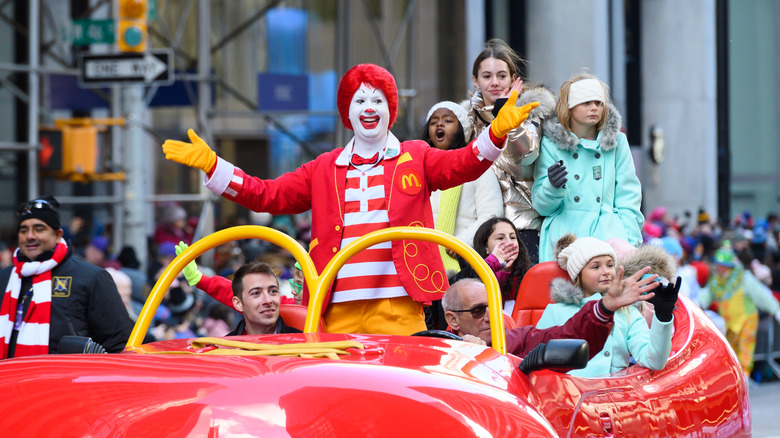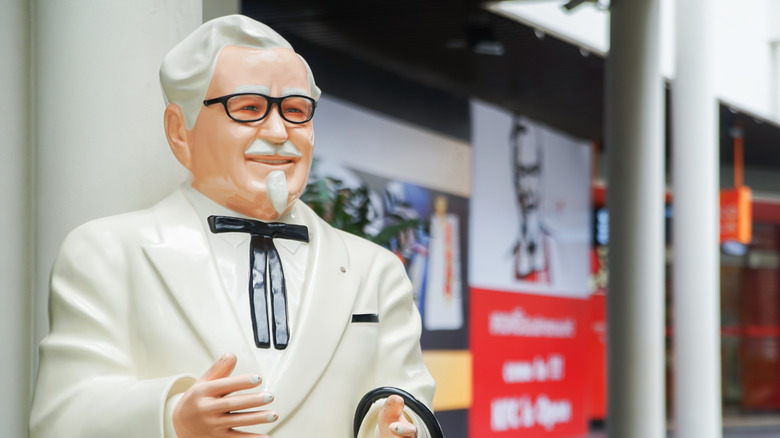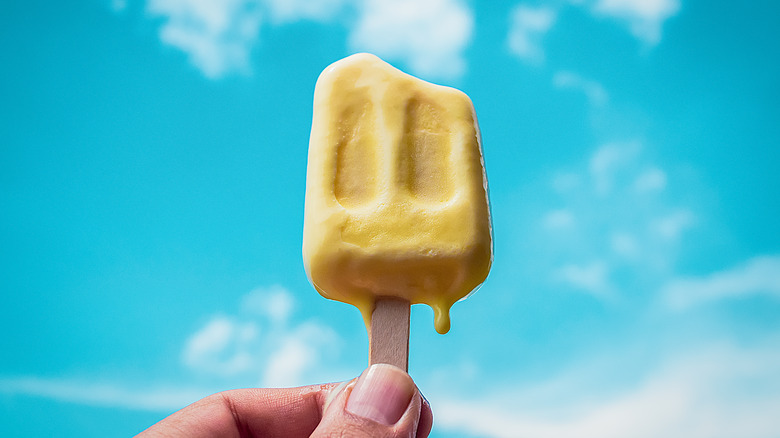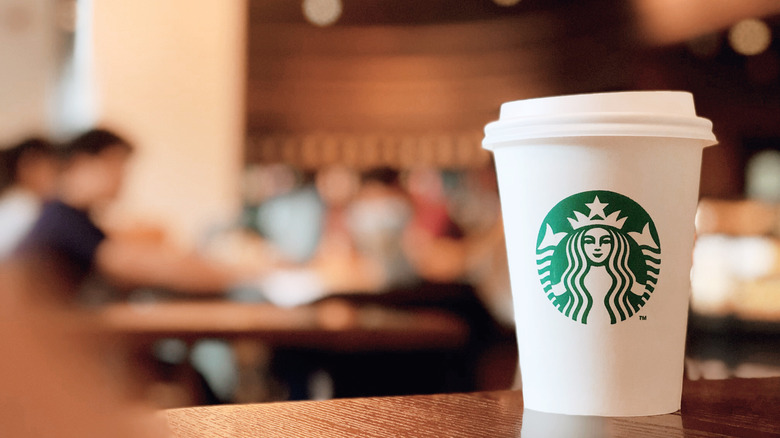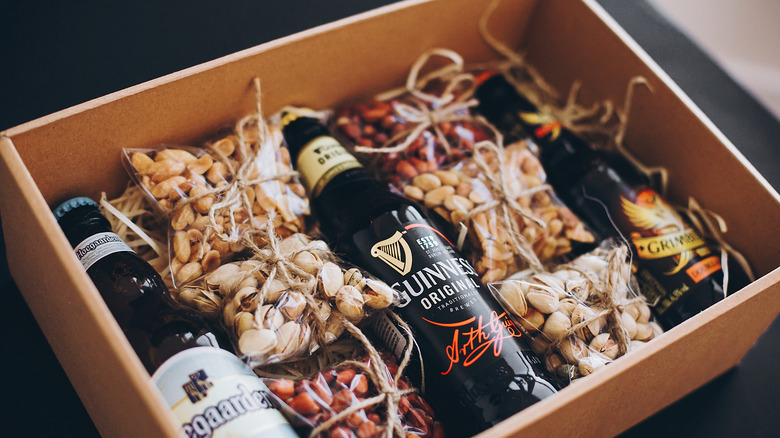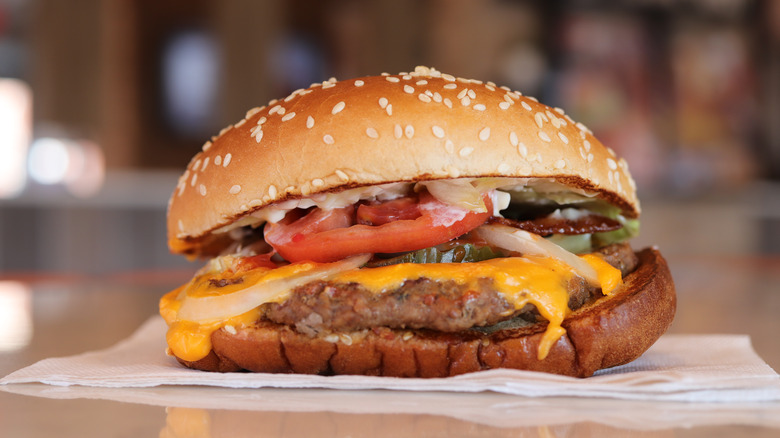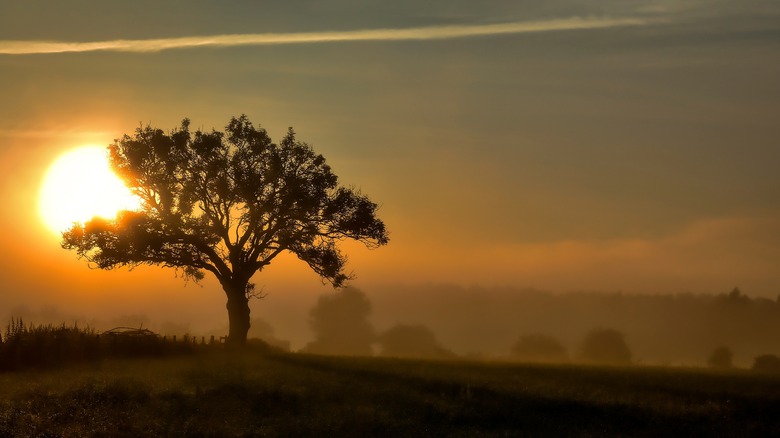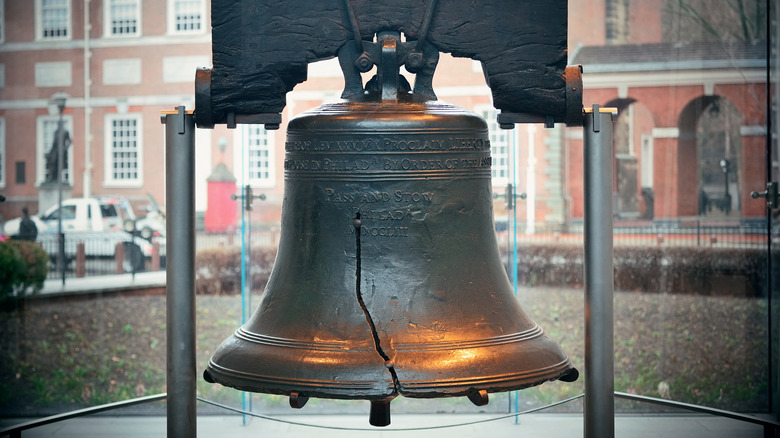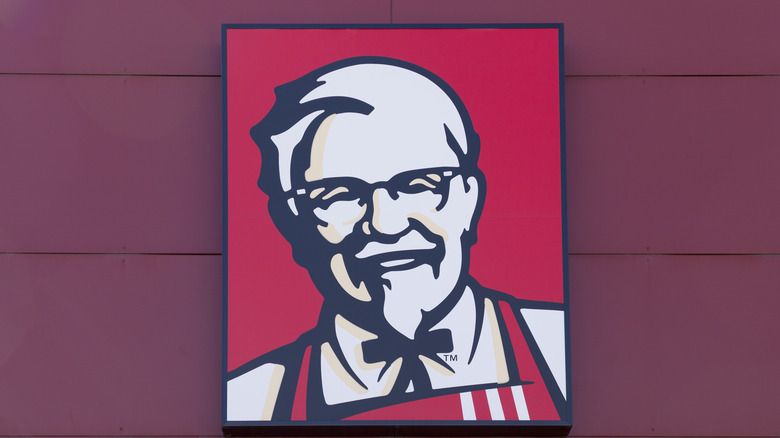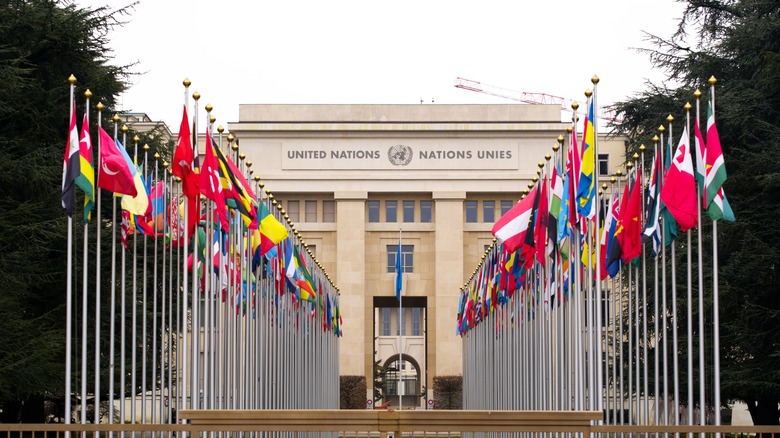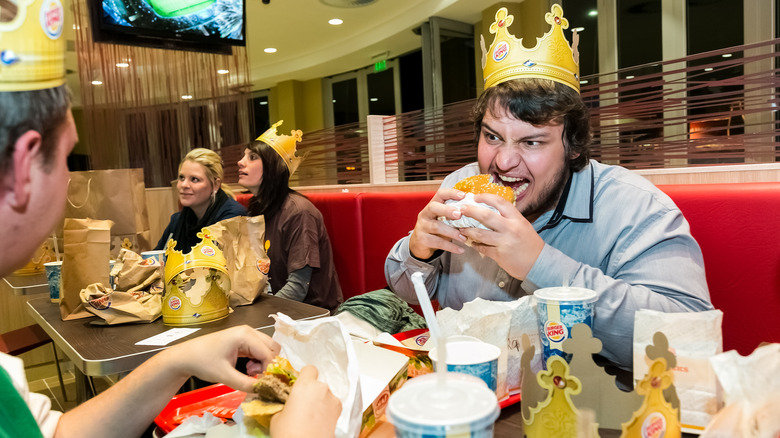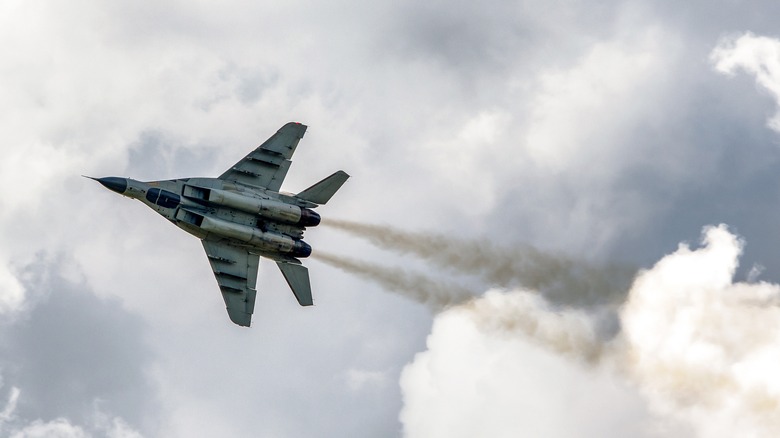11 Food Brand Publicity Stunts That Nobody Saw Coming
It often takes an army of people to come up with the perfect brand name. Every company is always in search of the next best tactic to get its name at the forefront of potential customers' minds, and when a brilliant idea finally does float around the marketing room, it's like lightning in a bottle. A great idea leads to a larger customer base, which means more profits. And there's nothing that puts a smile on a company's face quite like satisfied shareholders.
Over the years, there have been countless publicity stunts thought up by major food brands to help get people shelling out their hard-earned cash for the products. Many of these stunts have gone off without a hitch, but there have been others that spiraled down into a deep hole full of failure and embarrassment. These stunts are among some of the most unique ideas ever conceived by popular food brands. Be warned: They might give rise to a whole plethora of emotions because everyone who experienced these stunts firsthand likely did.
1. KFC had Colonel Sanders deliver lunches to window washers
In 2011, the city of Chicago was the focal point of a pretty wild tactic that KFC employed in order to get people to shell out more cash for fried chicken. The company took advantage of various social media channels and asked the people of America which group of workers were more than deserving of a "So Good" lunch. After sifting through hundreds of answers, one group reigned supreme: High-rise window washers. So, the brand came up with a rather bold plan of action.
The company employed someone to dress up like Colonel Sanders and strap on a harness from the top of Chicago's River Bend building, and drop off $5 Everyday Meals to the hardworking folks who were washing the outsides of the windows. According to Barry Westrum, the chief marketing officer for KFC, the $5 Everyday Meals are geared to help people enjoy a nice and affordable meal any day of the week. Westrum noted that having a five-dollar box meal delivered to a location selected by its fans was a great way of encouraging the menu item. This was a prime example of literally taking a creative endeavor to new heights.
2. Snapple caused a huge popsicle flood in New York City
Snapple is known for its array of flavored juices, but years ago, it made a move to get into the ice pop game, and it had a brilliant idea that would certainly wow fans of the brand and hopefully attract a bunch of new customers. The company's goal was to earn a Guinness World Record for the largest ice pop ever constructed: It would be a 20-ton, two-and-a-half story stick of kiwi-strawberry flavored ice, and it was to be built in New York City's Union Square. But, let's just say the Big Apple was soon treated to a rather sour ordeal.
The problem was that the person in charge of the construction, ice expert Max Bolkman Zuleta, didn't bank on the sweltering heat that blanketed the city that day. We all know what happens when you take an ice pop into the hot sun. Well, multiply that sticky, runny mess by 302,000, and that's the number of individual Snapple ice pop servings the installation consisted of. As you can imagine, pure bedlam ensued. The fire department was actually called to hose down the gallons of thick, sugary liquid that flowed through the streets like rainwater. Snapple did, however, still give free ice pops to all the kids watching the chaos erupt.
3. Starbucks gave points to people who spotted coffee cups on car roofs
It's always interesting to watch the general public's reaction when they're placed in a situation that tests whether or not they're good Samaritans. Well, Starbucks wanted to see just how good random people were for one very unique marketing campaign. It involved coffee and car roofs, and the campaign was met with very different reactions from the unwitting public who encountered it. This campaign was fascinating because it did two things: It helped advertise Starbucks while also putting human nature to the test.
The plan was this: Have someone place a magnetized Starbucks cup on the roof of their car (with no coffee in it) and begin driving around the streets of Washington to see which stranger, if any, would alert them to the cup out of concern. Anyone who approached the vehicle to tell them they forgot the coffee on their roof would receive five dollars towards a Starbucks beverage. Needless to say, some people clearly wanted to help, while others saw the cup but chose to mind their own business. It was definitely a unique way to observe the kindness of humanity while also advertising coffee.
4. Guinness filled the planet's oceans with special bottles
Considering the prevalence of social media today, it's easy to picture all sorts of marketing campaigns that utilize Facebook, Twitter, and the rest of them. It doesn't take much to reach millions of eyes with the click of a mouse. But that doesn't mean there weren't wildly successful campaigns that were enacted well before the Internet had us all connected. In 1954, Guinness concocted an epic plan to get people talking about its beer, and it worked like a charm.
A.W. Fawcett, the managing director of Guinness at the time, planned to drop 50,000 sealed Guinness bottles into the planet's oceans. The bottles were not filled with beer but special messages to those who were lucky enough to stumble across them on shorelines all over the world. People who found the messages and paid a visit to the Guinness Exports to return them were given a memento for their deed. The stunt was so popular that five years later, Guinness did it again, dropping 150,000 bottles into the Atlantic Ocean. This time around, the bottles were filled with small documents, like a certificate from the 'Office of King Neptune,' as well as how-to guides on making a table lamp using the empty bottle.
5. Burger King created beef-scented cologne
There are so many different perfumes and colognes available to help you smell nice. Many big-name fashion designers, like Calvin Klein and Ralph Lauren, have ines of hugely popular fragrances. But did you know that at one point, Burger King actually threw its hat into the scent ring? Yep, Burger King Japan actually created a limited-edition perfume that captured the enticingly meaty smell of the iconic Whopper sandwich.
This "Flame Grilled" cologne was targeted toward men who shunned any type of romantic relationship. These men could use the cologne to attract females who are super assertive. And what better way to attract a carnivore than the scent of a juicy, quarter-pound beef patty? So, did the cologne actually do the job it was intended to do? You'd have to speak with someone who managed to get their hands on a bottle. It did, however, get people talking about the brand, and in the end, that's exactly what matters most.
6. Tropicana built an artificial sun
The sun is big: Like really, really big. But leave it to the big brains on the marketing team at Tropicana to take one look at that bright ball of solar flares and decide that it wanted to make its own. Tropicana set up shop in the Canadian town of Inuvik and planned to build a faux sun to help promote a new line of juice, Tropicana Essentials, which featured added vitamin D and calcium. The location wasn't random, either. Due to the town's location, it experiences erratic sunlight during the course of the year. There are long stretches of time when the sun never sets, and other times it's dark for days on end. So, it was the ideal place for Tropicana to pull off this marketing tactic.
Tropicana used a 36-foot side helium balloon rigged with a boatload of lights to create an artificial sun for its "Brighter Mornings" campaign that rose up and illuminated the town of Inuvik. Tropicana also gave every household a free carton of orange juice, as well. And the promotional event was held at the same time as the town's Sunrise Festival, a celebration of the actual sun's appearance after weeks of night.
7. Taco Bell convinced people it purchased the Liberty Bell
Taco Bell urges people to think outside the bun, meaning that when burgers just won't satisfy a craving, look to a delicious taco instead. Customers who dine at Taco Bell might be thinking outside the bun, but the marketing team at Taco Bell certainly thinks outside the box. For one marketing ploy, the company and the public relations firm it worked with, PainePR, came up with an April Fool's gag that had some people chuckling at the absurdity of the whole thing and others riddled with confusion after totally falling for it.
On April Fool's Day in 1996, an image of the Liberty Bell appeared in various newspapers with a caption underneath stating Taco Bell had successfully purchased the bell and renamed it the Taco Liberty Bell. Of course, the company did not. There were plenty of people who recognized the prank for what it was, but there were loads of angry people who were irate that a fast food company had the nerve to take ownership of one of the country's most meaningful symbols. In fact, the National Park Service (the organization responsible for caring for the bell) received thousands of calls from the angry mob. In the end, the joke was revealed, but it definitely caused quite a stir for a short while.
8. KFC constructed a logo that was visible from space
There's a lot of speculation about whether or not aliens are real. Let's assume for a second they are. What kinds of things would we want them to know about Earth? And how exactly would we go about communicating it to a different species that whisks around the solar system in unidentified flying objects? Well, KFC made it a personal mission to inform any little green men cruising past the planet in their spacecraft that humans here love fried chicken: That's right, the company actually had an enormous image of Colonel Sanders constructed that was visible from space.
In 2006, the chain went through somewhat of a rebranding and created a new, updated logo of the colonel that gave off a savvy, cool-guy vibe. It gave the brand a modern touch: The kind that gets people stoked to take on buckets of chicken. But, it was how the company unveiled it that was pretty epic. A huge group of designers and scientists spent three months building a massive installation in Rachel, Nevada, a town located very close to Area 51. The goal was to create a logo that could be seen from outer space, and it worked. About 65,000 carefully assembled colored tiles were placed together like jigsaw pieces, and the result was an 87,500 square-foot picture of Harland Sanders gazing up at the stars above. The installation remained there for six months before the massive dismantling process began.
9. Colonel Sanders visited the United Nations
You'd think that an attempt to break into the United Nations building in New York would immediately get squashed by the massive amount of security patrolling every corner, and you'd be correct in that assumption. The U.N. is certainly no place to goof off; however, that doesn't mean it can't happen: Just ask KFC. The security at the UN was bypassed all for the sake of trying to spread the good word about new grilled chicken meals for one outlandish marketing ploy,
It's pretty wild to think an actor dressed like Colonel Sanders managed to make his way through security and into the main headquarters of the UN, but that's exactly what happened. The "colonel" not only was allowed in restricted areas, but he actually shook hands with Dr. Ali A. Treki, the President of the United Nations General Assembly at the time, while posing for a picture with him, as well. A KFC publicist explained that the colonel and the photographed actually talked their way into the UN building to ask that Grilled Nation join the UN as its 193rd member state. Needless to say, the intrusion did not earn that coveted seat the impostor was seeking.
10. Customers unfriended people for free Burger King food
Would you ever cause a disturbance in a friendship you had with someone else if you knew it would get you something free? We're not talking about a car or a vacation; no, we're referring to a Burger King Whopper. Who in their right mind could cut ties with someone they made so many great memories with over fast food? Well, a marketing team at Burger King learned pretty quickly that, apparently, a whole lot of people would gladly put relationships second when it comes to Burger King's iconic sandwich.
In January 2009, Burger King ran a promotional campaign called "Whopper Sacrifice," and it had the potential to put a lot of solid friendships in jeopardy. In order for every Whopper enthusiast out there to get a hold of a free burger, they needed to unfriend 10 of their pals on Facebook. That would grant them access to a coupon they could use to feast on their greasy, bunned prize. And, lots of people didn't hesitate when it came to clicking that "unfriend" button on the social media platform. In fact, almost 234,000 Facebook users found themselves with one less friend before the promotion came to an end. Let's just hope some of those unfriended friends tried the sandwich too.
11. Pepsi was sued after jokingly offering customers jets
People can get really competitive when there's a prize on the line. The kind of serious that has them spending every dollar they make in order to claw their way into the winner's circle. Take, for example, a promotional campaign Pepsi launched in 1996. Pepsi created Pepsi Points that customers could accrue with each purchase of the soft drink. As buyers gathered more points, they were able to trade them in for prizes. That was when a college student named John Leonard set a goal that resulted in a courtroom drama.
Viewers were jokingly told In a television commercial advertising the Pepsi Points contest that if they reached seven million points they could trade them in for an actual Harrier fighter jet. However, Leonard actually managed to convince a millionaire friend of his to bankroll his plan of buying the Pepsi Points at 10 cents a piece until reaching the seven-million point goal (Leonard's friend shelled out $700,000 in total).
However, when Leonard approached Pepsi with the points, the company stated it was clearly a joke and refused him the jet. The ordeal resulted in a lawsuit that was eventually thrown out by a judge who sided with the huge corporation, saying in his verdict that a humorous commercial would not lead to a reasonable person thinking that customers could get fighter planes through a promotion.
